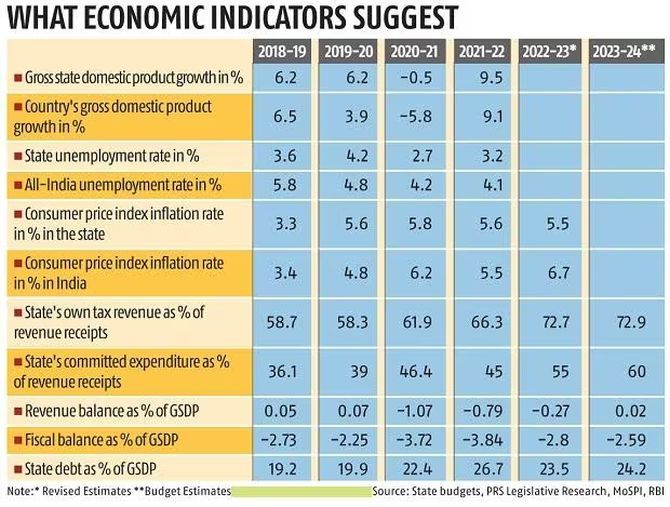
Political parties have promised various sops for people in their campaign for the Karnataka assembly elections to be held on May 10.
The state is financially sound to implement these schemes, but its committed expenditures are on the rise, which gives it a limited scope to dole out freebies.
Among various promises by political parties, the Congress has announced giving 200 units of free electricity, 10 kg of rice to low-income families, Rs 3,000 monthly allowance for unemployed graduates and Rs 1,500 for (jobless) diploma-holders for a period of two years.
The Janata Dal-Secular has announced an assistance of Rs 10,000 per acre for up to 10 acres for farmers to procure seeds and fertilisers under the Raitha Bandhu programme.
And the Aam Aadmi Party, a new entrant, has promised 300 units of free power for domestic users, free city bus transport for students, mohalla clinics and Rs 3,000 unemployment allowance till a candidate gets a job.
Karnataka is not a poor state. Its own tax revenue (OTR) constituted over 70 per cent of its revenue receipts in recent years and is projected to stand at almost 73 per cent in the current financial year.
The state does not have much revenue deficit.
In fact, it is projected to have a small revenue surplus of 0.02 per cent for the current financial year.
However, its committed liabilities --- salaries, pension, interest payments and administrative expenses -- are projected to gallop to 60 per cent for FY'24 from 55 per cent in the previous year and 45 per cent in 2021-2022.
The state is going to implement the 7th pay scale from the next financial year.
A fiscal consolidation paper presented along with the Budget for 2023-2024 says the implementation of the 7th pay scale for the state government employees would lead to a steep increase in salaries and pension liabilities of the Karnataka government in the coming years.
Depending on the fitment factor, the additional financial implication of implementing the 7th pay scale would range between Rs 12,000 crore (Rs 120 billion) and Rs 18,000 crore (Rs 180 billion) for the first year of implementation, it said.
If one adds other committed expenditures such as subsidies, financial assistance and devolution to local bodies, the total spend under this head is projected to constitute 92 per cent of revenue receipts in 2023-2024, according to the Budget papers.
As such, the state's revenue receipts might not afford various freebies announced by the parties, unless revenue deficit and hence fiscal deficit is widened.
At present, the fiscal deficit is well under three per cent of the gross state domestic product (GSDP).
Else, it will have to shrink its capital expenditure, which is projected to stand at Rs 58,328 crore (Rs 583.28 billion) in 2023-2024, constituting a bit more than one-fourth of the total expenditure at Rs 2.25 trillion.
The state has also sent a team of officials to Rajasthan to study its old pension scheme (OPS).
If political parties also compete with one another to bring the OPS back, the space for freebies will shrink further, though not immediately.
As the chart shows, the state's economic growth closely matched with the national GDP expansion and, in fact, surpassed it in recent years.
For instance, the state's economy expanded by 9.5 per cent, a bit higher than the national average of 9.1 per cent.
Its unemployment rate has been lower than the national average.
For instance, the rate stood at 3.2 per cent in 2021-2022 against 4.1 at the national level in 2021-2022.
The trend has been the same since 2018-2019. However, the periodic labour force survey (PLFS), from which data is compiled, did not bring out disguised unemployment.
The state's retail price inflation rate also closely matches with the national average, but the former was a bit lower than the latter in recent months.
While at 6.7 per cent, the national inflation rate stood above the Reserve Bank of India's upper tolerance level of 6 per cent in the first 11 months of the current financial year, it was a bit lower at 5.5 per cent in the state.
However, in February this year, the rate was above the RBI's upper tolerance level in Karnataka as well (6.03 per cent), though it was lower than the all-India level of 6.44 per cent.












